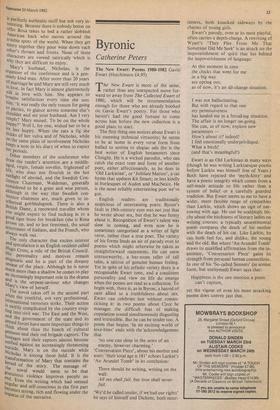Byronic
Catherine Peters
The New Ewart is more of the same, rather than any unexpected move for- ward or away from The Collected Ewart of 1980, which will be recommendation enough for those who are already hooked on Gavin Ewart's poetry. For those who haven't had the good fortune to come across him before the new collection is a good place to start.
The first thing one notices about Ewart is his stunning technical virtuosity; he seems to be at home in every verse form from ballad to sestina to elegiac ode (he is the best writer of English hexameters since Clough). He is a wicked parodist, who can catch the exact tone and form of another poet, either affectionately, as he does in `Old Larkinian', or 'Jubilate Matteo', a cat hymn that updates Kit Smart; or less kindly in burlesques of Auden and MacNeice. He is the most reliably entertaining poet we've got.
English readers are traditionally suspicious of entertaining poets: Byron's fault in 19th-century eyes was not just that he wrote about sex, but that he was funny about it. Recognition of Ewart's talent was slow in coming, and even now he is sometimes categorised as a writer of light verse, rather than a true poet. The variety of his forms lends an air of parody even to poems which might otherwise be taken as straightforward statements. He can seem untrustworthy, a bar-room teller of tall tales, a satirist of genuine human feeling. Yet in spite of his infinite variety there is a recognisable Ewart tone, and a consistent personality and view on life do emerge when the poems are read as a collection. To begin with, there is, as in Byron, a hatred of cant allied to a truthfulness about sex. Ewart can celebrate lust without roman- ticising it: in two poems about Circe he manages the difficult feat of making copulation sound simultaneously disgusting and irresistible. But he can be tender too. A poem that begins 'In an exciting world of love-bites' ends with the 'acknowledgement that `no one can sleep in the arms of an enemy, however charming.'
'Conversation Piece', about his mother and aunt: 'their total age is 181' echoes Larkin's 'An Arundel Tomb' in its conclusion: There should be writing, writing on the wall: All sex shall fail, but love shall never fail.
'We'd be called tender, if we had our rights' he says of himself and Dickens, both enter- tainers, both knocked sideways by the charms of young girls.
Ewart's parody, even at its most playful, often carries a depth-charge. A rewriting of Wyatt's 'They Flee From Me That Sometime Did Me Seek' is an attack on the impoverishment of spirit that lies behind the impoverishment of language: At this moment in time the chicks that went for me in a big way are opting out; as of now, it's an all-change situation.
I was not hallucinating.
But with regard to that one my permissiveness has landed me in a forsaking situation.
The affair is no longer on-going.
She can, as of now, explore new parameters — • How's about it? indeed!
I feel emotionally underprivileged.
What a bitch!
(and that's meaningful!)
Ewart is an Old Larkinian in many ways (though he was writing Larkinesque poems before Larkin was himself free of Yeats.) Both have rejected the 'myth-kitty' and have a poetic integrity which comes from a self-made attitude to life rather than a system of belief or a carefully guarded tradition. But Ewart seems to me to have a. wider, more flexible range of sympathies than Larkin, which shows no sign of nar- rowing with age. He can be scaldingly bit- chy about the bitchiness of literary ladies on writing courses: a typically unsentimental poem compares the death of his mother with the death of his cat. Like Larkin, he can both feel for, and dislike, the young and the old. But where 'An Arundel Tomb' draws its qualified affirmation from the in- animate, 'Conversation Piece' gains its strength from personal human connections. In one of his 'So-called Sonnets' (in sonnet form, but unrhymed) Ewart says that:
Happiness is the one emotion a poem can't capture, yet the vigour of even his most attacking poems does convey just that.


































 Previous page
Previous page